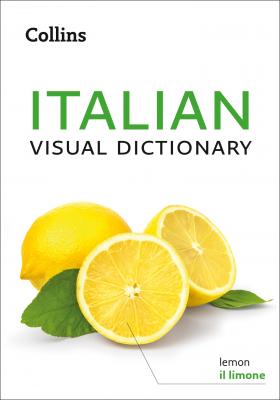Collins Italian Visual Dictionary. Collins Dictionaries
Читать онлайн.| Название | Collins Italian Visual Dictionary |
|---|---|
| Автор произведения | Collins Dictionaries |
| Жанр | Книги для детей: прочее |
| Серия | |
| Издательство | Книги для детей: прочее |
| Год выпуска | 0 |
| isbn | 9780008319960 |
Published by Collins
An imprint of HarperCollins Publishers
Westerhill Road
Bishopbriggs
Glasgow G64 2QT
First Edition 2019
© HarperCollins Publishers 2019
Collins® is a registered trademark of HarperCollins Publishers Limited
Ebook Edition © March 2019
ISBN: 9780008319960
Version: 2019-03-27
All rights reserved under International and Pan-American Copyright Conventions. By payment of the required fees, you have been granted the non-exclusive, non-transferable right to access and read the text of this ebook on screen. No part of this text may be reproduced, transmitted, downloaded, decompiled, reverse engineered, or stored in or introduced into any information storage and retrieval system, in any form or by any means, whether electronic or mechanical, now known or hereafter invented, without the express written permission of HarperCollins.
Entered words that we have reason to believe constitute trademarks have been designated as such. However, neither the presence nor absence of such designation should be regarded as affecting the legal status of any trademark.
HarperCollins does not warrant that any website mentioned in this title will be provided uninterrupted, than any website will be error free, that defects will be corrected, or that the website or the server that makes it available are free of viruses or bugs. For full terms and conditions please refer to the site terms provided on the website.
If you would like to comment on any aspect of this book, please contact us at the given address or online.
E-mail [email protected]
CONTENTS
Whether you’re on holiday or staying in Italy for a slightly longer period of time, your Collins Visual Dictionary is designed to help you find exactly what you need, when you need it. With over a thousand clear and helpful images, you can quickly locate the vocabulary you are looking for.
The Visual Dictionary includes:
10 chapters arranged thematically, so that you can easily find what you need to suit the situation
images – illustrating essential items
YOU MIGHT SAY… – common phrases that you might want to use
YOU MIGHT HEAR… – common phrases that you might come across
VOCABULARY – common words that you might need
YOU SHOULD KNOW… – tips about local customs or etiquette
USING YOUR COLLINS VISUAL DICTIONARY
In order to make sure that the phrases and vocabulary in the Collins Visual Dictionary are presented in a way that’s clear and easy to understand, we have followed certain policies when translating:
1) The polite form “Lei” (you) has been used throughout the text as this is always safe to use, even if a bit formal at times, for example:
How are you? Come sta?
Remember that if you are addressing an older person or someone you have just met, you use “Lei”. However, if you are speaking to children, or those you know well, you can use “tu”. Italian people may invite you to use “tu” with them:
Shall we call each other “tu”? Diamoci del tu?
Note that personal pronouns (I, you and so on) are not usually used in Italian except for emphasis:
Sto bene. I’m well.
2) The grammatical gender of Italian nouns has been indicated using the articles “il” or “lo” (masculine) or “la” (feminine). All nouns which have the article “l’” have been shown with their gender, for example:
year l’anno m
exit l’uscita f
In many cases, particularly in words describing professions, the masculine form of the noun tends to
